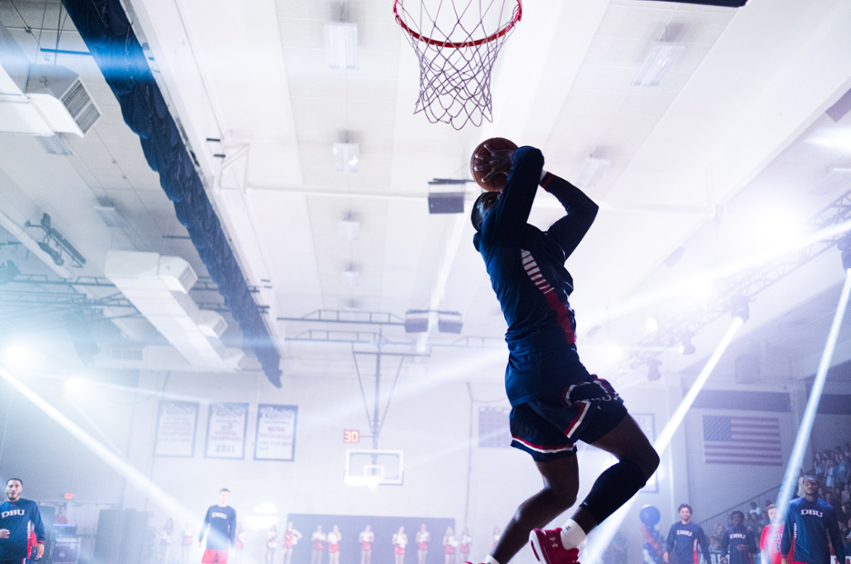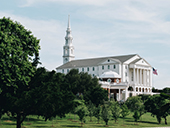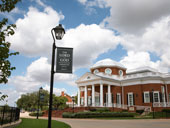No, They Should Not Shut Up and Just Play Basketball: Athletes, Entertainers, Activists and the Quest for Social Change
This article is over six months old and may reference former titles for DBU faculty or staff, discontinued programs, or other details that have since changed. If you have any questions, please contact us at news@dbu.edu, or (214) 333-5172.

The writer of Ecclesiastes tells us,"that which has been is now; and that which is to be has already been; and God requires that which is past" (Ecclesiastes 3:15). Solomon's admonishment informs us that there is a fundamental connection between events and that nothing happens by chance or is disconnected past, present, or future; and most importantly, that the Creator of the universe is in control.
We know from scripture that God is deeply concerned with justice and mercy. There are five facets to biblical justice as outlined by Pastor Tim Keller in a recent article: Community, Equity, Corporate Responsibility, Individual Responsibility, and Advocacy. This does not imply that every action undertaken in the name of justice aligns with biblical principles, but rather that God asks his people to assume responsibility and advocate for the victims of injustice. We do this by applying our biblical worldview to the challenges in front of us. When others confront those same challenges through a worldview lens slightly or vastly different from our own, we must not denounce the advocacy wholesale, but instead dig into the nuance and find common cause in areas of agreement.
The actions taken last week in protest of the police shooting of Jacob Blake by players of the National Basketball Association (and subsequently the Women's National Basketball Association, National Hockey League, Major League Baseball, and the Women's Tennis Association) are historic on many levels, yet they have also been seen before in another context and in another place in time. History can be a great teacher.
Athletes (as well as entertainers) have historically played an important role in advancing our nation on matters of justice and equality. During the Civil Rights Movement, Reverend Martin Luther King Jr. called upon such people of influence to speak to the social, political, and moral issues of their day. King was convinced that people of influence and affluence were not insulated from experiencing injustice nor were they absolved from the obligation to speak up when they witnessed injustice. Athletes and entertainers such as Jackie Robinson, Muhammad Ali, Kareem Abdul-Jabbar, James Garner, Tommie Smith,John Carlos, Joan Baez, Marlon Brando, Eartha Kitt, and Mahalia Jackson, have done more than hit home runs, dribble a ball down court, or act on a big screen. Often these men and women exhibited nothing short of moral courage in the face of unimaginable hardship and vulnerability. They risked their livelihoods and-- at times-- even their personal safety to get into what the late congressman and civil rights leader John Robert Lewis termed, "good trouble."
"That which has been is now; and that which is to be has already been."
After the success of the Montgomery Bus Boycott in 1956, King traveled to New York looking to sustain momentum from this historic victory. He met with Representative Adam Clayton Powell and other community leaders to raise awareness and money for the Civil Rights Movement. King also requested a meeting with the acclaimed actor, singer, and activist, Harry Belafonte. At the age of 28, King sat across from Belafonte in the basement of the historic Abyssinian Baptist Church and said, "I have no idea where this movement is headed, but I do know I need your help." Belafonte's reputation as a voice and force for political and social change was known to King and others; he'd been an outspoken critic of the U.S. government on racial inequality and had actually sent money to support the Montgomery Bus Boycott. At this consequential meeting, Belafonte pledged his unwavering support to King and to the movement. Months later, a fundraiser was held in Madison Square Garden, sponsored by "In Friendship," a civil rights organization. The headliners were Belafonte, Duke Ellington, and Coretta Scott-King, an accomplished pianist in her own right.
"That which has been is now; and that which is to be has already been."
Later, when King sought to advance the Civil Rights Movement in Birmingham, Alabama, Belafonte secured additional funding to post bail for would-be protesters. Without such resources, King would not have gone to jail to launch "Project C" (The Birmingham Campaign), nor would the nation have been blessed shortly after with one of the most profound writings of the 20th century, the "Letter from Birmingham Jail."
Just after the birth of the 1964 Mississippi Summer Project, the bodies of civil rights workers James Chaney, Michael Schwerner, and Andrew Goodman were found in a dam. They had been violently abducted, beaten, shot, and murdered. The killings were emotionally and spiritually devastating for the movement, as well as for the nation. However, King and members of SNCC (Student Nonviolent Coordinating Committee) needed funding to continue the work for justice and equality. Belafonte raised $70,000 in two days, and committed to deliver the cash in person. He called upon his friend and fellow actor Sidney Poitier to accompany him for a trip down south to Greenwood, Mississippi. They arrived late at night on a private airstrip. Moments later, as they traveled down a back road with satchels of cash in hand, their vehicle was ambushed by members of the Ku Klux Klan and were nearly run off the road. Other members of SNCC intervened, however, and escorted them away from danger.
"That which has been is now; and that which is to be has already been."
On January 16, 1965, the American Football League scheduled its annual all-star game at New Orleans' Tulane Stadium. Twenty-one All-Star African American players protested the game's location, based on the city's overt policies of discrimination. Cab drivers, hotels, and local restaurants were on record as having refused services to African Americans. African American players threatened to boycott the game altogether, but team owners did not support their objections. However, white players also joined the cause for equality and subsequently, league commissioner Joe Foss changed the venue to Houston, Texas. The AFL players took action and brought change, despite risk of suspension and financial loss.
"That which has been is now; and that which is to be has already been."
Toward the end of his life, King was critical of America's involvement in the war in Vietnam. He was outspoken in saying that the war was immoral and diverted the nation's attention from the war here at home—one against poverty, racism, and militarism. King was openly rebuked by every major newspaper in the country, as well as civil rights organizations including the National Association for the Advancement of Colored People (NAACP) and the National Urban League (NUL). Even the Southern Christian Leadership Council (SCLC) attempted to distance itself from their co-founder's public stance on matters of war and peace, as they feared economic hardship from loss of donors.
Muhammad Ali, one of the men who initially rebuffed King's appeal to get involved in the civil rights struggle years earlier was now influencing King on matters of war and peace. Like King, the heavyweight champion was outspoken against the war but was a full year ahead of King in publicly rebuking the Johnson administration and the nation as a whole for fighting in Southeast Asia. The civil rights leader was now emboldened by Ali's public stance. Despite fierce public backlash, Ali and King remained committed to their objections to the war, and eventually teamed up again to support initiatives for fair and equal housing programs in Ali's hometown of Louisville, Kentucky.
"That which has been is now; and that which is to be has already been."
Professional athletes and entertainers are human beings. They are mothers and fathers; they are sisters and brothers; and, most certainly, they are citizens who do not give up their rights to assemble, to peacefully protest and raise their voices, to comfort those who are wronged and to confront those who do wrong.
In 2003, under the leadership of President George W. Bush, the PEPFAR (President's Emergency Plan for AIDS Relief) program was launched. Less than three years later, rock star Bono of U2, spoke at the National Prayer Breakfast in Washington, D.C. As Bush and a legion of faith leaders and D.C. insiders looked on, Bono quoted Jesus and the prophets of the Old Testament; he even praised President Bush for his leadership on something that was vitally important to the Irish rock star. In the months and years prior to the prayer breakfast, Bono had been openly critical of the Bush administration's policies, from its treatment of the poor to the Iraq War. But Bush and Bono had something in common: their commitment to end poverty, address global debt relief, and defeat the AIDS pandemic on the continent of Africa. Bono's "RED" campaign took up similar issues to that of PEPFAR. First brought together by then National Security Advisor Condoleezza Rice, Bono and Bush became known as the ultimate odd couple, and for years each served as central figures in the global community's effort to confront these challenges. As of January of 2020, PEPFAR has been credited with saving over 27 million lives and the "RED" campaign has generated over $600 million dollars to support AIDS relief in places like Kenya, Rwanda, South Africa, and Zambia.
In 2015, John Legend won an Academy Award for his collaboration with the rapper Common on the song "Glory," for the movie Selma. In his acceptance of the prestigious award, he highlighted the issue of mass incarceration that adversely impacts African Americans. He then took off for a music tour and a series of press conferences to bring attention to the problem. Among his first stops: the state of Texas.
And there are so many more:
Country music icon Toby Keith and award-winning actor Greg Sinise have taken up the cause for helping homeless veterans.
Singer and songwriter Alicia Keys is one of the most outspoken people on the planet on matters such as AIDS and bullying.
Actress Eva Longoria, who spoke at the Democratic Convention in August 2020 (and has done so since 2004), has been at the forefront of social, economic and political issues for years. Longoria has championed issues related to education and entrepreneurship for women through her foundation; and, as a native Texan, Longoria earned a master's degree in Chicano studies. She has generously given both time and money to causes such as voting rights and gender equality.
The late Kobe Bryant, global icon and NBA basketball star, was traveling to a game near downtown Los Angeles one evening years ago, when he saw a homeless encampment that included women and children near the Staples Center (home of the Lakers). Moved by this, he got involved in efforts with the United Way to confront the issue of homelessness in Los Angeles.
The late rock legend Prince was a huge champion of YesWeCode, an Oakland, California nonprofit committed to bring people of color forward in the tech world.
NBA champion and television producer LeBron James has partnered with other athletes to launch the multimillion-dollar national voter registration campaign, More Than a Vote. Political scientists argue it's one of the most far reaching programs to date.
"That which has been is now; and that which is to be has already been."
The issue of athletes and entertainers being outspoken is not new. As King believed, it takes people of goodwill, what he termed a "coalition of conscience," to advance the nation on matters of equality and justice. The amount of money a person earns or the status they possess should not preclude them from the responsibilities of civic engagement. Why should they not steward their influence for the cause of justice and equality for all, regardless of the color of one's skin. Too often we are critical of athletes and entertainers for "getting involved." As a society, do we see calls for people in other professions to remain silent? Why is it that athletes and entertainers are told not to voice their opinions on such matters but professionals from other industries are not similarly constrained?
CPAs are not told to be quiet and count numbers; teachers are not told to shut up and teach; landscapers are not challenged to go focus on maintaining lawns and shrubs. These rebukes against social action are not heard, nor should they be. Some athletes and entertainers may make millions, but they are not removed from the capacity to show anger, empathy, outrage, righteous indignation, love, hope, or compassion. Some pastors have thousands of parishioners and have been by society's standards successful, yet they have been woefully misguided or missing in action on issues of justice and equality, especially when compared to the work of many athletes and entertainers.
I call upon all people of goodwill, particularly those entrusted with the responsibility of leadership, to use the power and position they possess to move our nation forward. There is no moral courage in remaining silent in these unprecedented times. Divine apathy is a myth; Jesus is not only concerned with life after death but also with how we live our lives. From boardrooms to basketball courts, from the halls of Congress to the White House, from universities to Wall Street, from pulpits to concert halls, leaders must consider what they can do to make King's "beloved community" a reality.
For more on how athletes and entertainers played a role in advancing the Civil Rights Movement, read the book by Marcus Goodie Goodloe, Ph.D., entitled KingMaker: Applying Dr. Martin Luther King Jr.'s Leadership Lessons in Working With Athletes and Entertainers.
The Institute for Global Engagement is a Christian, non-sectarian think tank dedicated to addressing issues in the public square with biblical distinctiveness. The mission of the IGE is to be a moral and spiritual catalyst for renewal in our culture. Founded in 2015, the IGE values the biblical narrative, thoughtful consideration, and gracious civility.
Dr. Marcus "Goodie" Goodloe is Senior Fellow for Ethics and Justice at the DBU Institute for Global Engagement (IGE). Goodloe is an alumnus and longtime friend of DBU serving as an adjunct professor in the Gary Cook School of Leadership and frequent speaker at Veritas Lecture Series and DBU chapel services. As Senior Fellow, Dr. Goodloe provides thought leadership for DBU and IGE audiences via written material, lectures, and webinars. He specializes on matters of leadership through influence, social justice, and research regarding the life of Martin Luther King Jr.








